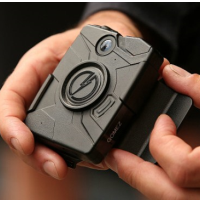Judge Orders Implementation of Bodycam Program that Boston Police Tried Hard to Avoid
 (photo: Al Seib, L.A. Times via Getty Images)
(photo: Al Seib, L.A. Times via Getty Images)
By Zack Huffman, Courthouse News Service
BOSTON (CN) - Boston began its police bodycam pilot program on Monday after a superior court judge rejected a request by the city's largest police union to delay it.
While Judge Douglas Wilson found no evidence the union actively sought to sabotage the program in the decision he handed down Friday, he nevertheless criticized it for what he described as its "lackluster" effort to recruit volunteers from its ranks to participate in the six-month program.
The city had sought 100 volunteers to wear the bodycams. When few stepped forward, city officials announced the program was no longer voluntary and that it would choose the officers to participate in the program.
The Boston Police Patrolmen's Association sued the city in Suffolk Superior Court last week claiming the unilateral move violated a standing agreement between the parties.
But in his 19-page ruling (pdf), Judge Wilson said the union did not try hard enough to convince its membership to take part.
"The Pilot Program needed only 100 volunteers out of 1200 eligible patrol officers," Douglas wrote. "The Court agrees with both sides' witnesses that, with active efforts by the BPPA to recruit volunteers from its ranks, at least one hundred volunteers likely would have materialized — certainly not zero."
In June, prior to the city and the union reaching an agreement on how the bodycam program would proceed, the BPPA sent out a memo to its members stating the union's opposition to the use of body cams.
"The position of the BPPA is that NOBODY (emphasis in original) in the BPPA membership should volunteer for this program," said the memo, which Wilson referenced. "If you are ordered to wear the camera, you should obey the order and notify the BPPA leadership immediately. This is a change of working conditions and needs to be bargained."
One month later, an agreement was reached for the pilot program, which would include 100 volunteers who would each receive a $500 stipend.
The judge also determined that Massachusetts law allows police commissioners to make decisions about deployment, uniforms and equipment, citing a recent decision in state court that found that a police commissioner had the authority to order GPS devices in police cruisers without having to negotiate it. This defeats the union's claim that the order to wear body cameras is bound by ongoing labor contract negotiations between both parties.
"The Court sees no defensible distinction between the non-delegable decisions regarding uniforms, weapons, duties and assignments and the order in this case to wear BWCs (body-worn cameras) as part of the standard equipment and mission of officers participating in the Pilot Program," wrote Wilson.
In its complaint, the union presented results from a Rand Corp. study that found an increase in acts of violence committed against police officers when they wore body cams, but the court was unconvinced, considering that the Rand study included international police departments and the City of Boston was able to present contrary studies that focused exclusively on the United States.
"At best, in the Court's view, the state of the research is inconclusive, particularly as to implementation of BWCs in Boston," wrote Wilson. "That in itself is a reason to conduct the Pilot Program here."
While expressing disappointment in the court's decision, BPPA President Pat Rose vowed to continue working with the city on its body cam program.
"I am disappointed in the court's ruling," Rose said in a written statement. "But I still believe asking for the injunction was the right thing to do. If we don't fight to preserve our collective bargaining rights, we could lose those rights. If we don't challenge the City when they violate signed agreements, then how can we enforce agreements in the future? Let me say this, though: Injunction or no injunction, the BPPA is still committed to working with the City and the Department to make sure the citizens of Boston get a body-worn camera pilot program that does what it is supposed to do, while respecting the rights of citizens and police officers alike."
To Learn More:
Boston Police Patrolmen’s Association v. City of Boston (Suffolk Superior Court, Commonwealth of Massachusetts) (pdf)
U.S. Marshals Service Balks at Use of Bodycams when they Work with Local Police (by Steve Straehley, Danny Biederman)
The Clash over Police Body Cameras Heats Up (by Danny Biederman and Noel Brinkerhoff, AllGov)
Complaints and Use of Force Drop after Rialto Police Don Tiny Video Cameras (by Ken Broder, AllGov California)
- Top Stories
- Unusual News
- Where is the Money Going?
- Controversies
- U.S. and the World
- Appointments and Resignations
- Latest News
- Trump to Stop Deportations If…
- Trump Denounces World Series
- What If China Invaded the United States?
- Donald Trump Has a Mental Health Problem and It Has a Name
- Trump Goes on Renaming Frenzy






Comments